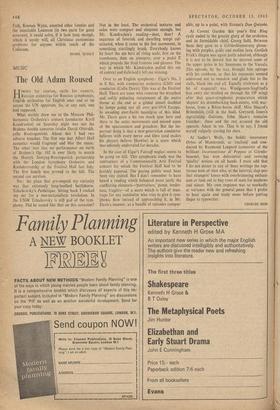M U SIC
The Old Adam Roused
HORSES for courses, cattle for country, Russian orchestras for Russian symphonies, English orchestras for English ones and so on across the UN spectrum. So, at any rate, one had supposed.
What mainly drew me to the Moscow Phil- harmonic Orchestra's concert (conductor Kyril Kondrashin) on Saturday night was not the Brahms double concerto (violin David Oistrakh, cello Rostropovich). About this I had two adverse hunches. The first was that Albert Hall acoustics would fragment and blur the music. The other was that no performance on earth of Brahms's Op. 102 is ever likely to match the Henryk Szeryng-Rostropovich partnership with the London SyMphony Orchestra and Rozhdestvensky at the Festival Hall last July. The first hunch was proved to the hilt. The second one survives.
No; the piece that pre-empted my curiosity was that extremely long-toothed battlehorse, Tchaikovsky's Pathetique. Sitting back I cocked my ear for a neo-nationalistic revelation. In the USSR Tchaikovsky is still god of the -sym- phony. Did he sound like that on this occasion? Not in the least. The orchestral textures and solos were compact and eloquent enough, but Mr. Kondrashin's reading—dear, dear I A sequence of feverish and dwarfing tempi cul- minated, when it came to the last movement, in something startlingly brash. Everybody knows by heart 'the ten bars of rising scale, first on the trombones, then on trumpets, over a pedal E which precede the final frenzies and glooms. The way in which Mr. Kondrashin pulled this out of context and italicised it left me wincing.
Over to an English symphony: Elgar's No. 2 in E flat, with compatriot orchestra (LSO) and conductor (Colin Davis). This was at the Festival Hall. There are some who construe the wreathed and softly pulsating restatement of the motto theme at the end as a gilded sunset doubled by lamps going out all over pre-1914 Europe. In avoiding over-facile nostalgias of this kind, Mr. Davis gave a bit too much spur here and there to the outer movements and missed some of the spaciousness and grandeur. But the im- portant thing is that a new-generation conductor believes with every nerve and fibre (and makes his players believe likewise) in a score which was odiously underrated for decades.
In the case of Elgar's Falstafl neglect seems to be going on still. This symphonic study was the centrepiece of a Commonwealth Arts Festival concert for which the Festival Hall had to be lavishly papered. The paying public must have been tiny indeed. But I don't remember to have heard a reading which balanced more justly the conflicting elements—`portraiture,' pomp, tender- ness, fragility—of a score which is full of man- traps for any conductor who tries to give it sym- phonic flow instead of approaching it, in Mr. Davis's manner, as a bundle of episodes compar- At Covent Garden this year's first Ring cycle ended to the greater glory of the orchestra and its formidable chief, Georg Solti. Between them they gave us a GOtterddinmerung gleam- ing with purples, golds and molten lava. Gottlob Frick's Hagen was again justly admired, although it is not to be denied that he shouted some of the upper notes in his Summons to the Vassals. This episode, by the way, brought him upstage with his cowhorn, so that his summons seemed addressed not to meadow and glade but to the stalls, black ties and all. Equally irrelevant as a bit of stagecraft was Windgassen-Siegfried's first entry (he strolled on through the OP wing) after that quasi-symphonic preparation which `depicts' his disembarking back-centre, with war- horse, from a Rhine-borne skiff. Miss Shuard's Brtinnhilde (still in the bud), Gwyneth Jones's ingratiating Gutrune, John Shaw's tentative Gunther: these and the rest aroused the old operatic Adam in me. That is to say, I found myself vulgarly craving for stars.
At Sadler's Wells, the boldly innovatory Or of Monteverdi, as 'realised' and con- ducted by Raymond Leppard (conceiver of the brilliant Incoronazione di Pop pea at Glynde- bourne), has won deferential and revering `quality' notices on all hands. I must add that I do not detect in any of these writings the rap- turous note of men who, at the interval, slap per- fect strangers' knees with overbrimming enthusi- asm or rush out to buy rows of seats for nephews and nieces. My own response was so markedly at variance with the general paean that I prefer to hear again and study more before putting finger to typewriter.
CHARLES REID






































 Previous page
Previous page